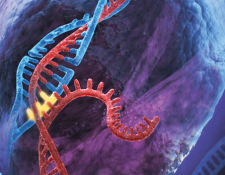Aggregated News

Scientists have genetically modified isolated microbes for decades. Now, using CRISPR, they intend to target entire microbiomes.
Humans are never alone. Even in a room devoid of other people, they are always in the company of billions of microscopic beings. By residing in and on the human body, these bacteria, fungi, and viruses form complex ecosystems that exert powerful effects on a range of health conditions, such as antitumor responses, gut inflammatory diseases, and mental health.1-3
With such striking effects, many scientists see modulating the microbiomes as a promising avenue for improving human health and wellbeing. In recent years, researchers have shown that tweaking the genomes of resident microorganismsoffers new ways to treat and diagnose diseases.4-6 Despite these advances, most efforts to engineer microbes focus on a handful of well characterized and genetically tractable microbes, leaving most of these microbial communities in uncharted territories.
When looking at widely studied microbiomes such as the human gut microbiome, less than 10 percent of the constituent microbes can be genetically manipulated, according to James Marsh, a...



